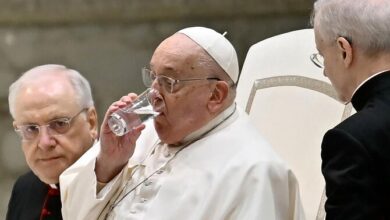Breakthrough: HIV-Prevention Drug to Be Available for $40 Annually From 2027

(DDM) – Saudi Arabia’s Grand Mufti, Sheikh Abdulaziz bin Abdullah Al-Sheikh, has died after more than two decades as the Kingdom’s top religious authority.
- Diaspora Digital Media (DDM) gathered that the Saudi Royal Court confirmed his death on Tuesday but did not specify the cause.
Multiple media outlets in Riyadh reported that the senior cleric was 82 years old at the time of his passing.
Funeral prayers were held after Asr at the Imam Turki bin Abdullah Mosque, Riyadh, attended by scholars, officials, and citizens.
As Saudi custom dictates, burial took place immediately at a nearby cemetery, with national mourning declared.
By directive of King Salman, funeral prayers in absentia were also offered at the Grand Mosque in Makkah, the Prophet’s Mosque in Madinah, and mosques across the Kingdom.
Among dignitaries were the Emir of Madinah, Prince Salman bin Sultan, and Makkah’s Deputy Emir, Prince Saud bin Mishaal.
Worshippers prayed for divine mercy, forgiveness, and Paradise for the late Mufti, who was regarded as a scholar of rare distinction.
Sheikh Abdulaziz Al-Sheikh was born in Makkah into the historic Al ash-Sheikh family, descendants of Imam Muhammad ibn Abd al-Wahhab.
He memorised the Qur’an at an early age but lost his sight completely by 17, growing up as an orphan with remarkable resilience.
In 1961, he enrolled at Imam Mohammad bin Saud Islamic University, Riyadh, graduating in 1965 with a degree in Arabic and Shariah.
He began his career teaching at Imam al-Dawa Institute before becoming associate professor at the College of Shariah and later at the Higher Institute of Judiciary.
His preaching duties included leading prayers at the Sheikh Muhammad bin Ibrahim Mosque and later at the Imam Turki bin Abdullah Mosque in Riyadh.
In 1982, he was appointed imam and preacher of Namirah Mosque in Arafat, where he delivered the central Hajj sermon for 33 consecutive years.
Those annual sermons, broadcast globally, shaped the faith of millions of pilgrims and elevated his reputation worldwide.
In 1991, he was appointed a full-time senior member of the Permanent Committee for Scholarly Research and Ifta.
By 1995, he became Deputy Grand Mufti, before succeeding Sheikh Abdulaziz Ibn Baz as Grand Mufti in June 1999 under King Fahd.
As head of the Council of Senior Scholars, Al-Sheikh issued landmark fatwas and guided the Kingdom on social, legal, and doctrinal issues.
He was known for rulings that included banning forced marriages in 2005 and backing women’s right to drive in 2018.
In other rulings, he condemned the mixing of genders in economic forums and controversially described chess as “the work of Satan.”
His voice became familiar through radio call-in programs like “Nur ‘Ala al-Darb,” where he answered questions from Muslims across the globe.
Al-Sheikh authored influential works and compilations on fiqh, zakat, fasting, prayer, hajj, and Islamic doctrine, many still studied today.
Tributes have poured in from across the Muslim world, highlighting his stature as a scholar and global religious leader.
Pakistan’s President Asif Ali Zardari and Prime Minister Shehbaz Sharif hailed him as a “great loss” for Muslims everywhere.
The Supreme Fatwa Council of Syria lauded his legacy of guidance, Dawah, and decades of service to Islamic scholarship.
Egypt’s Grand Mufti, Dr Shawky Allam, also prayed for his soul, describing him as a beacon of moderation and knowledge.
Blind since his youth yet unshaken in scholarship, Sheikh Abdulaziz Al-Sheikh became a central pillar of Saudi Arabia’s religious establishment.
His wisdom, calm authority, and deep knowledge influenced public thought, national policy, and global Muslim communities.
He leaves behind a lasting legacy of leadership, teaching, and service to Islam that will resonate for generations to come.
Post Views: 104





